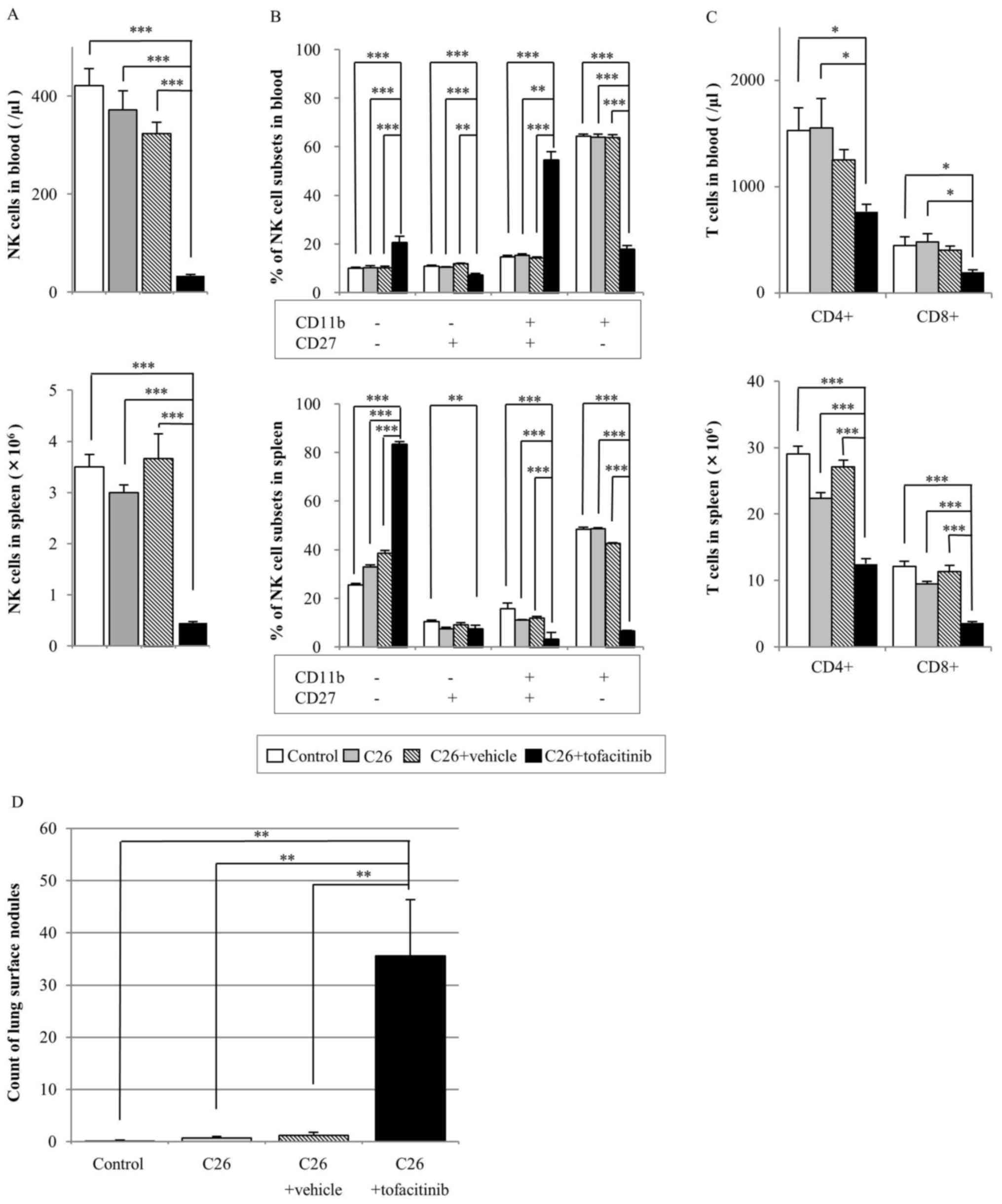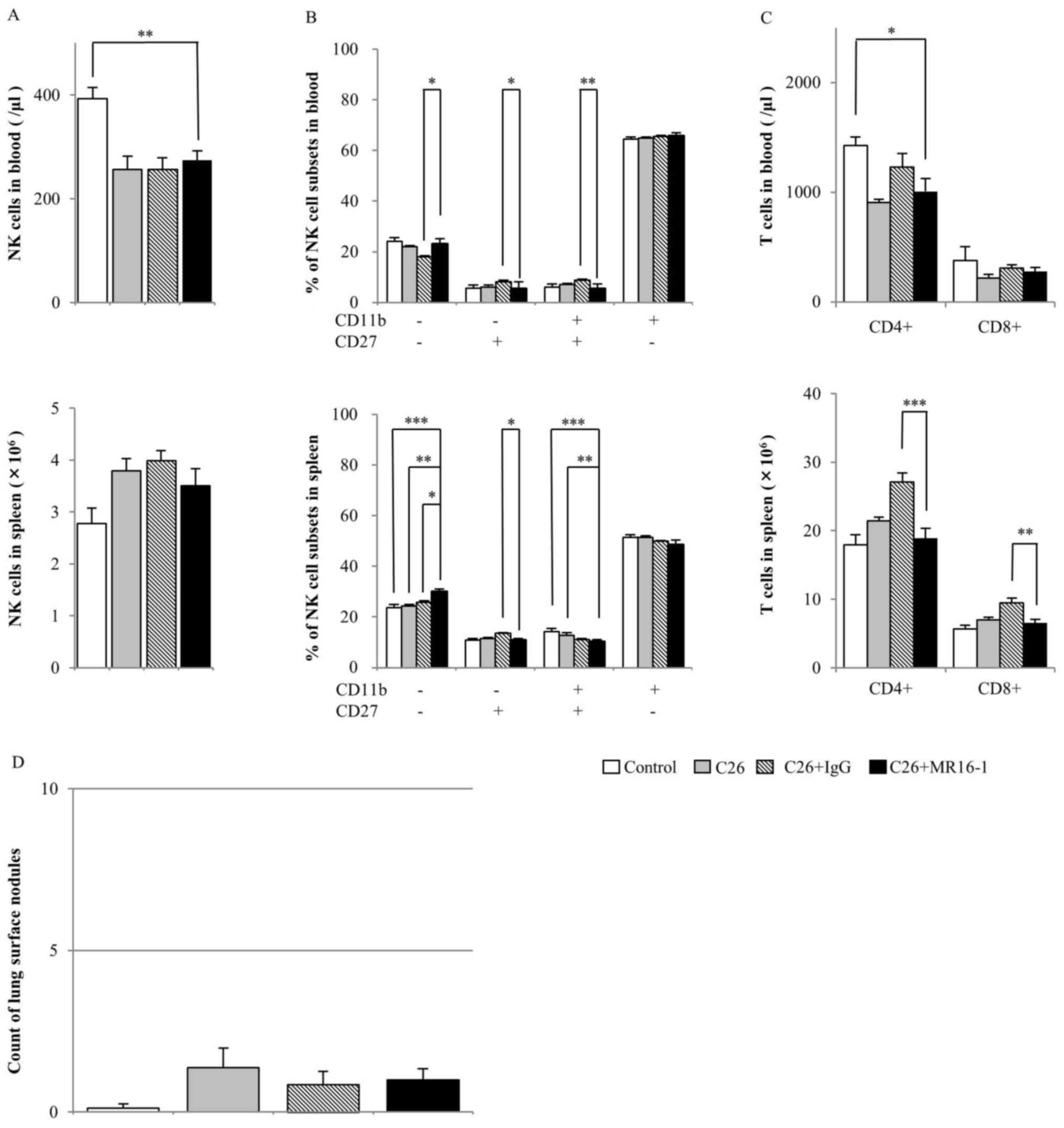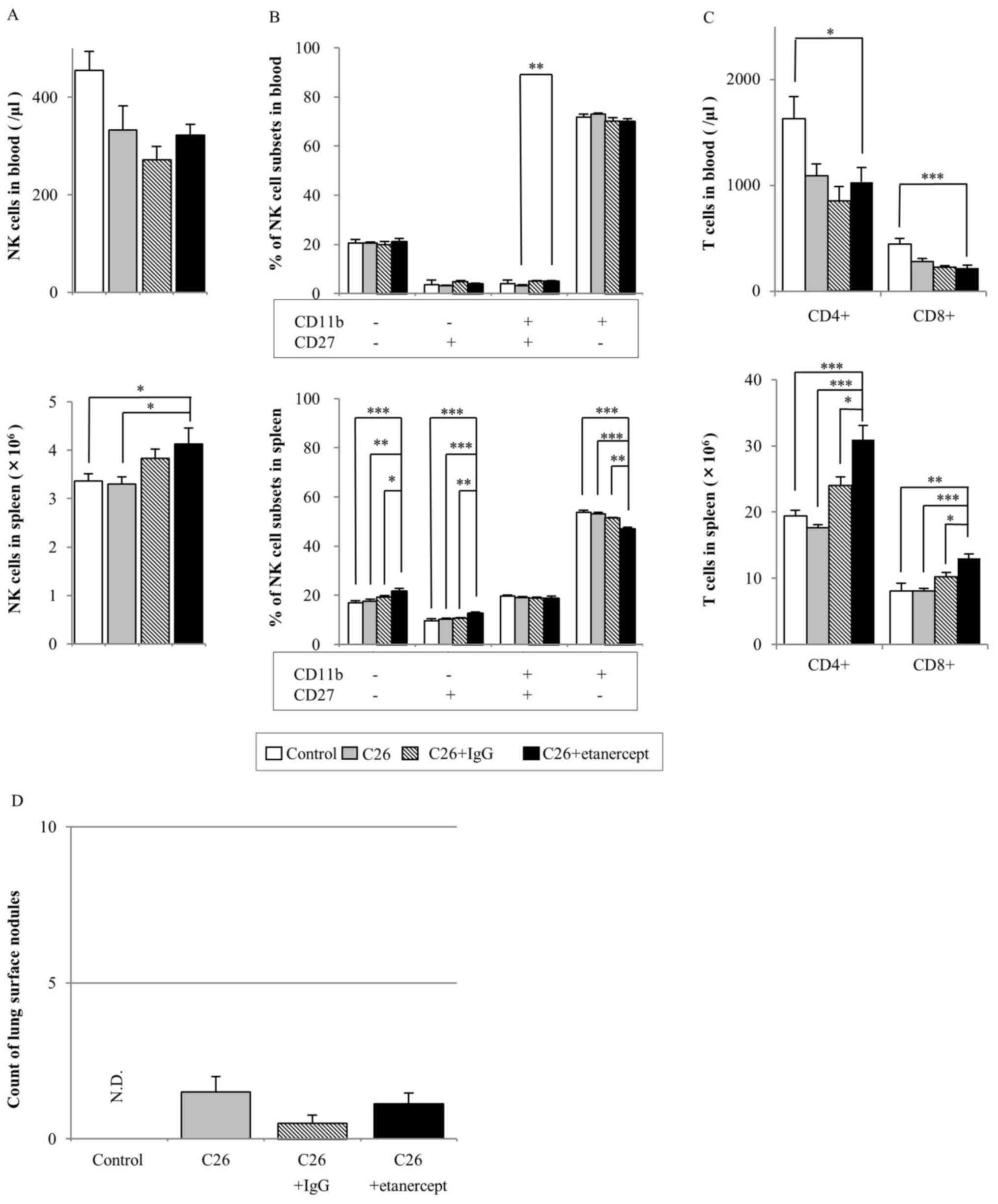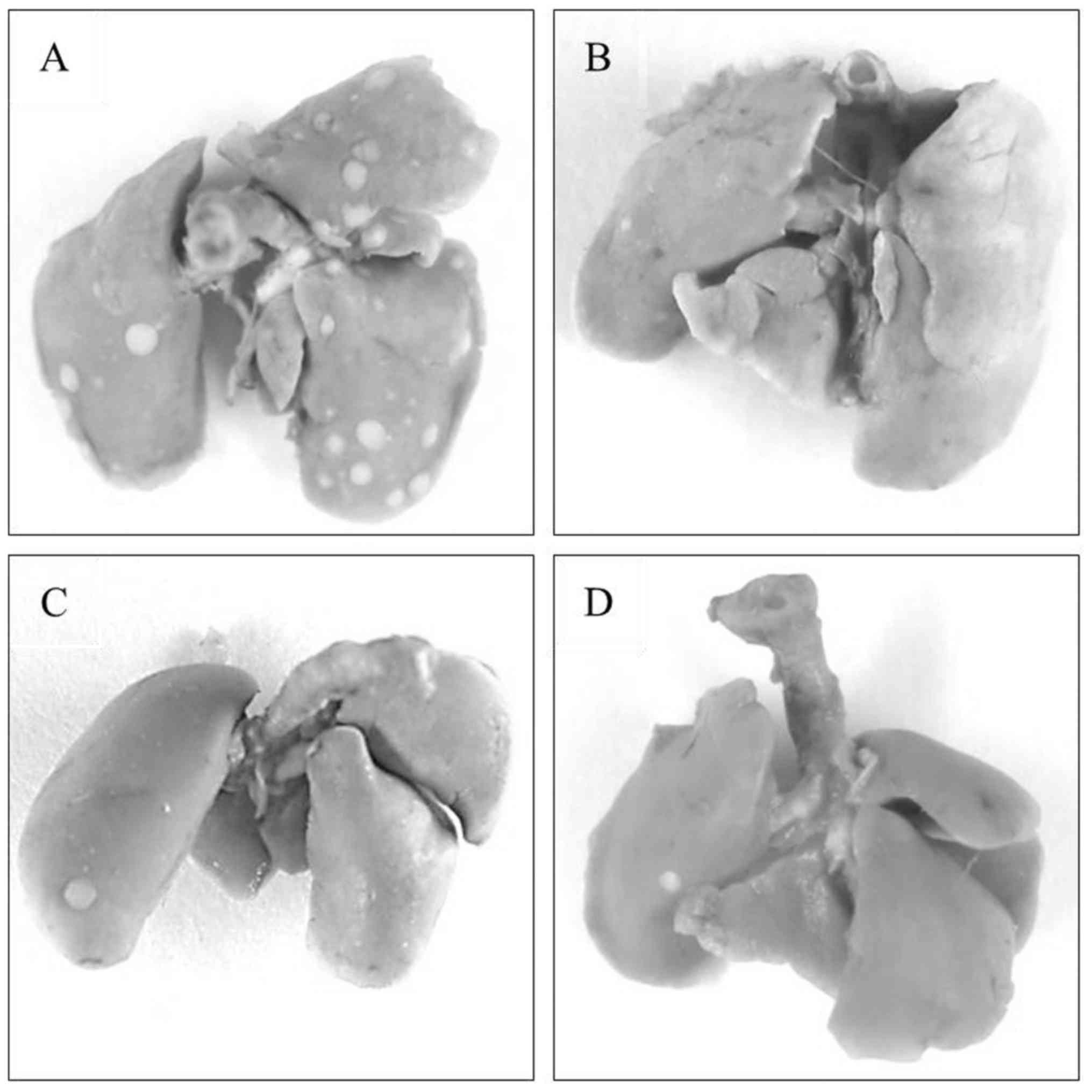|
1
|
Whiteside TL and Herberman RB: The role of
natural killer cells in immune surveillance of cancer. Curr Opin
Immunol. 7:704–710. 1995. View Article : Google Scholar : PubMed/NCBI
|
|
2
|
Hanna N and Burton RC: Definitive evidence
that natural killer (NK) cells inhibit experimental tumor
metastases in vivo. J Immunol. 127:1754–1758. 1981.PubMed/NCBI
|
|
3
|
Kelly SA, Gschmeissner S, East N and
Balkwill FR: Enhancement of metastatic potential by
gamma-interferon. Cancer Res. 51:4020–4027. 1991.PubMed/NCBI
|
|
4
|
Mailloux AW, Clark AM and Young MR: NK
depletion results in increased CCL22 secretion and Treg levels in
Lewis lung carcinoma via the accumulation of CCL22-secreting
CD11b+CD11c+ cells. Int J Cancer. 127:2598–2611. 2010. View Article : Google Scholar : PubMed/NCBI
|
|
5
|
Yano S, Nishioka Y, Izumi K, Tsuruo T,
Tanaka T, Miyasaka M and Sone S: Novel metastasis model of human
lung cancer in SCID mice depleted of NK cells. Int J Cancer.
67:211–217. 1996. View Article : Google Scholar : PubMed/NCBI
|
|
6
|
Coca S, Perez-Piqueras J, Martinez D,
Colmenarejo A, Saez MA, Vallejo C, Martos JA and Moreno M: The
prognostic significance of intratumoral natural killer cells in
patients with colorectal carcinoma. Cancer. 79:2320–2328. 1997.
View Article : Google Scholar : PubMed/NCBI
|
|
7
|
Ishigami S, Natsugoe S, Tokuda K, Nakajo
A, Che X, Iwashige H, Aridome K, Hokita S and Aikou T: Prognostic
value of intratumoral natural killer cells in gastric carcinoma.
Cancer. 88:577–583. 2000. View Article : Google Scholar : PubMed/NCBI
|
|
8
|
Bos R and Sherman LA: CD4+ T-cell help in
the tumor milieu is required for recruitment and cytolytic function
of CD8+ T lymphocytes. Cancer Res. 70:8368–8377. 2010.
View Article : Google Scholar : PubMed/NCBI
|
|
9
|
Schild HJ, Kyewski B, von Hoegen P and
Schirrmacher V: CD4+ helper T cells are required for
resistance to a highly metastatic murine tumor. Eur J Immunol.
17:1863–1866. 1987. View Article : Google Scholar : PubMed/NCBI
|
|
10
|
Funada Y, Noguchi T, Kikuchi R, Takeno S,
Uchida Y and Gabbert HE: Prognostic significance of CD8+
T cell and macrophage peritumoral infiltration in colorectal
cancer. Oncol Rep. 10:309–313. 2003.PubMed/NCBI
|
|
11
|
Waldburger JM and Firestein GS: Garden of
therapeutic delights: New targets in rheumatic diseases. Arthritis
Res Ther. 11:2062009. View
Article : Google Scholar : PubMed/NCBI
|
|
12
|
Siebert S, Tsoukas A, Robertson J and
McInnes I: Cytokines as therapeutic targets in rheumatoid arthritis
and other inflammatory diseases. Pharmacol Rev. 67:280–309. 2015.
View Article : Google Scholar : PubMed/NCBI
|
|
13
|
Emery P, Breedveld F, van der Heijde D,
Ferraccioli G, Dougados M, Robertson D, Pedersen R, Koenig AS and
Freundlich B; Combination of Methotrexate and Etanercept in Early
Rheumatoid Arthritis Trial Group, : Two-year clinical and
radiographic results with combination etanercept-methotrexate
therapy versus monotherapy in early rheumatoid arthritis: A
two-year, double-blind, randomized study. Arthritis Rheum.
62:674–682. 2010. View Article : Google Scholar : PubMed/NCBI
|
|
14
|
Genovese MC, Rubbert-Roth A, Smolen JS,
Kremer J, Khraishi M, Gómez-Reino J, Sebba A, Pilson R, Williams S
and Van Vollenhoven R: Longterm safety and efficacy of tocilizumab
in patients with rheumatoid arthritis: A cumulative analysis of up
to 4.6 years of exposure. J Rheumatol. 40:768–780. 2013. View Article : Google Scholar : PubMed/NCBI
|
|
15
|
Lundquist LM, Cole SW and Sikes ML:
Efficacy and safety of tofacitinib for treatment of rheumatoid
arthritis. World J Orthop. 5:504–511. 2014. View Article : Google Scholar : PubMed/NCBI
|
|
16
|
van Vollenhoven RF, Fleischmann R, Cohen
S, Lee EB, García Meijide JA, Wagner S, Forejtova S, Zwillich SH,
Gruben D, Koncz T, et al: Tofacitinib or adalimumab versus placebo
in rheumatoid arthritis. N Engl J Med. 367:508–519. 2012.
View Article : Google Scholar : PubMed/NCBI
|
|
17
|
Fujimoto M, Serada S, Mihara M, Uchiyama
Y, Yoshida H, Koike N, Ohsugi Y, Nishikawa T, Ripley B, Kimura A,
et al: Interleukin-6 blockade suppresses autoimmune arthritis in
mice by the inhibition of inflammatory Th17 responses. Arthritis
Rheum. 58:3710–3719. 2008. View Article : Google Scholar : PubMed/NCBI
|
|
18
|
Milici AJ, Kudlacz EM, Audoly L, Zwillich
S and Changelian P: Cartilage preservation by inhibition of Janus
kinase 3 in two rodent models of rheumatoid arthritis. Arthritis
Res Ther. 10:R142008. View
Article : Google Scholar : PubMed/NCBI
|
|
19
|
Takagi N, Mihara M, Moriya Y, Nishimoto N,
Yoshizaki K, Kishimoto T, Takeda Y and Ohsugi Y: Blockage of
interleukin-6 receptor ameliorates joint disease in murine
collagen-induced arthritis. Arthritis Rheum. 41:2117–2121. 1998.
View Article : Google Scholar : PubMed/NCBI
|
|
20
|
Okazaki M, Yamada Y, Nishimoto N,
Yoshizaki K and Mihara M: Characterization of anti-mouse
interleukin-6 receptor antibody. Immunol Lett. 84:231–240. 2002.
View Article : Google Scholar : PubMed/NCBI
|
|
21
|
Conklyn M, Andresen C, Changelian P and
Kudlacz E: The JAK3 inhibitor CP-690550 selectively reduces NK and
CD8+ cell numbers in cynomolgus monkey blood following
chronic oral dosing. J Leukoc Biol. 76:1248–1255. 2004. View Article : Google Scholar : PubMed/NCBI
|
|
22
|
Kudlacz E, Perry B, Sawyer P, Conklyn M,
McCurdy S, Brissette W, Flanagan And M and Changelian P: The novel
JAK-3 inhibitor CP-690550 is a potent immunosuppressive agent in
various murine models. Am J Transplant. 4:51–57. 2004. View Article : Google Scholar : PubMed/NCBI
|
|
23
|
Sonomoto K, Yamaoka K, Kubo S, Hirata S,
Fukuyo S, Maeshima K, Suzuki K, Saito K and Tanaka Y: Effects of
tofacitinib on lymphocytes in rheumatoid arthritis: Relation to
efficacy and infectious adverse events. Rheumatology (Oxford).
53:914–918. 2014. View Article : Google Scholar : PubMed/NCBI
|
|
24
|
U.S. Food and Drug Administration, .
Advisory Committee meeting. Tofacitinib for treatment of rheumatoid
arthritis (NDA 203214). Pfizer Inc.; 2012
|
|
25
|
Ando T, Ito H, Arioka Y, Ogiso H and
Seishima M: Combination therapy with α-galactosylceramide and a
Toll-like receptor agonist exerts an augmented suppressive effect
on lung tumor metastasis in a mouse model. Oncol Rep. 33:826–832.
2015.PubMed/NCBI
|
|
26
|
Mlecnik B, Tosolini M, Kirilovsky A,
Berger A, Bindea G, Meatchi T, Bruneval P, Trajanoski Z, Fridman
WH, Pagès F and Galon J: Histopathologic-based prognostic factors
of colorectal cancers are associated with the state of the local
immune reaction. J Clin Oncol. 29:610–618. 2011. View Article : Google Scholar : PubMed/NCBI
|
|
27
|
Lodolce JP, Boone DL, Chai S, Swain RE,
Dassopoulos T, Trettin S and Ma A: IL-15 receptor maintains
lymphoid homeostasis by supporting lymphocyte homing and
proliferation. Immunity. 9:669–676. 1998. View Article : Google Scholar : PubMed/NCBI
|
|
28
|
Waldmann TA: The biology of IL-15:
Implications for cancer therapy and the treatment of autoimmune
disorders. J Investig Dermatol Symp Proc. 16:pp. S28–S30. 2013;
View Article : Google Scholar : PubMed/NCBI
|
|
29
|
Chiossone L, Chaix J, Fuseri N, Roth C,
Vivier E and Walzer T: Maturation of mouse NK cells is a 4-stage
developmental program. Blood. 113:5488–5496. 2009. View Article : Google Scholar : PubMed/NCBI
|
|
30
|
Fu B, Wang F, Sun R, Ling B, Tian Z and
Wei H: CD11b and CD27 reflect distinct population and functional
specialization in human natural killer cells. Immunology.
133:350–359. 2011. View Article : Google Scholar : PubMed/NCBI
|
|
31
|
Clinthorne JF, Beli E, Duriancik DM and
Gardner EM: NK cell maturation and function in C57BL/6 mice are
altered by caloric restriction. J Immunol. 190:712–722. 2013.
View Article : Google Scholar : PubMed/NCBI
|
|
32
|
Smyth MJ, Thia KY, Cretney E, Kelly JM,
Snook MB, Forbes CA and Scalzo AA: Perforin is a major contributor
to NK cell control of tumor metastasis. J Immunol. 162:6658–6662.
1999.PubMed/NCBI
|
|
33
|
Street SE, Cretney E and Smyth MJ:
Perforin and interferon-gamma activities independently control
tumor initiation, growth and metastasis. Blood. 97:192–197. 2001.
View Article : Google Scholar : PubMed/NCBI
|
|
34
|
Hunter CA and Jones SA: IL-6 as a keystone
cytokine in health and disease. Nat Immunol. 16:448–457. 2015.
View Article : Google Scholar : PubMed/NCBI
|
|
35
|
Hodge DR, Hurt EM and Farrar WL: The role
of IL-6 and STAT3 in inflammation and cancer. Eur J Cancer.
41:2502–2512. 2005. View Article : Google Scholar : PubMed/NCBI
|
|
36
|
Cifaldi L, Prencipe G, Caiello I,
Bracaglia C, Locatelli F, De Benedetti F and Strippoli R:
Inhibition of natural killer cell cytotoxicity by interleukin-6:
Implications for the pathogenesis of macrophage activation
syndrome. Arthritis Rheumatol. 67:3037–3046. 2015. View Article : Google Scholar : PubMed/NCBI
|
|
37
|
Feldmann M: Development of anti-TNF
therapy for rheumatoid arthritis. Nat Rev Immunol. 2:364–371. 2002.
View Article : Google Scholar : PubMed/NCBI
|
|
38
|
Brown SL, Greene MH, Gershon SK, Edwards
ET and Braun MM: Tumor necrosis factor antagonist therapy and
lymphoma development: Twenty-six cases reported to the Food and
Drug Administration. Arthritis Rheum. 46:3151–3158. 2002.
View Article : Google Scholar : PubMed/NCBI
|
|
39
|
Diak P, Siegel J, La Grenade L, Choi L,
Lemery S and McMahon A: Tumor necrosis factor alpha blockers and
malignancy in children: Forty-eight cases reported to the Food and
drug administration. Arthritis Rheum. 62:2517–2524. 2010.
View Article : Google Scholar : PubMed/NCBI
|
|
40
|
Popivanova BK, Kitamura K, Wu Y, Kondo T,
Kagaya T, Kaneko S, Oshima M, Fujii C and Mukaida N: Blocking
TNF-alpha in mice reduces colorectal carcinogenesis associated with
chronic colitis. J Clin Invest. 118:560–570. 2008.PubMed/NCBI
|
|
41
|
Choo MK, Sakurai H, Koizumi K and Saiki I:
TAK1-mediated stress signaling pathways are essential for
TNF-alpha-promoted pulmonary metastasis of murine colon cancer
cells. Int J Cancer. 118:2758–2764. 2006. View Article : Google Scholar : PubMed/NCBI
|
|
42
|
Fichtner-Feigl S, Terabe M, Kitani A,
Young CA, Fuss I, Geissler EK, Schlitt HJ, Berzofsky JA and Strober
W: Restoration of tumor immunosurveillance via targeting of
interleukin-13 receptor-alpha 2. Cancer Res. 68:3467–3475. 2008.
View Article : Google Scholar : PubMed/NCBI
|


















